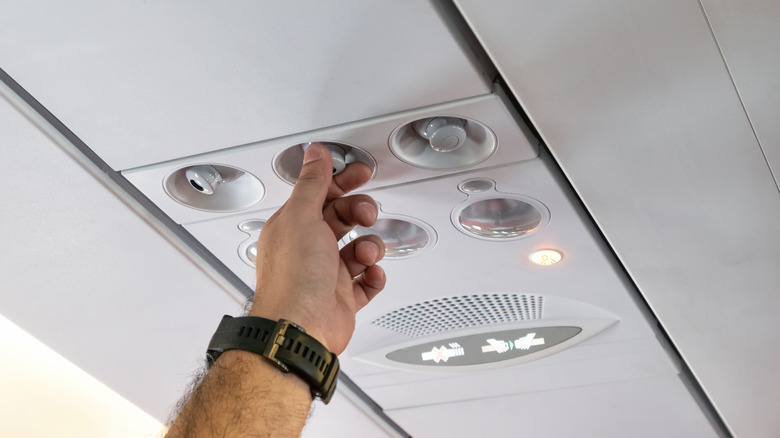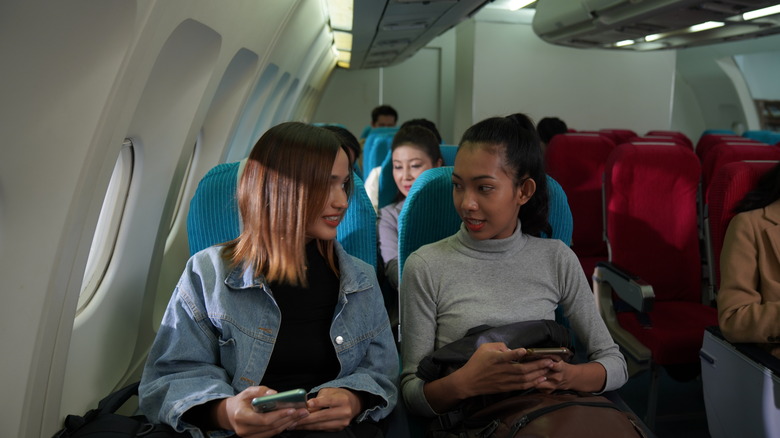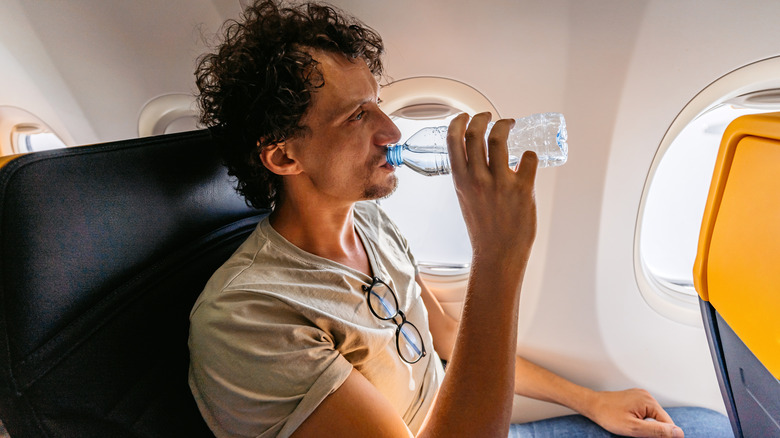The Gross Reason You May Want To Avoid Closing The Plane's Air Vent Even If You're Cold
Plane cabins are known to get chilly, especially once the aircraft reaches cruising altitude. Considering the airline-provided blankets are among the germy spots you should never touch on an airplane, your next best option for staying warm might seem to be closing off the air vent above your seat. However, closing your vent could be even worse for your health than snuggling up with those used blankets and pillows.
According to some medical experts, it's a good idea to keep your vent open, even if the plane feels a little frosty. As Dr. Mark Gendreau, chief medical officer at Beth Israel Lahey Health's Beverly Hospital, shared with DailyMail.com, closing the fan above your seat exposes you to more airborne viral particles, especially if your seatmate has a cough or a passenger a few rows back has the flu. "A lot of people don't take advantage of [the vent], but what that does [is] that provides you with a little more air turbulence in your area that you're sitting in," the medical professional explained. "If there is a viral particle coming your way, theoretically it can push that and move it quickly out of your space."
How plane air vents keep you healthy
You may have heard before that recirculated air on planes isn't good for your health or puts you at risk for catching a cold or COVID-19. In reality, the air blowing out of the overhead vents is much safer to breathe than lingering cabin air. The air contains fresh oxygen from outside, which has been processed to make it easier to breathe, combined with air from within the plane. This mixture of gasses is cooled and then purified using a high-efficiency particulate air (HEPA) filter. According to the International Air Transport Association (IATA), the air filters on commercial planes are similar to the ones used in hospitals and remove over 99.9% of bacteria, viruses, and fungi floating around.
Since cabin air is continuously being refreshed, you'll breathe in some clean air even without using the fan above your seat. However, opening the vent ensures you're inhaling the highest quality air and keeps yucky germs from hanging around in your personal space. And, in case you get cold easily, there's some good news: You don't need to have the fan blowing directly on your face to reap the benefits. "It just needs to be pointed a little bit in front of you and down," Dr. Mark Gendreau told DailyMail.com.
Stay comfortable (and healthy) with these tips
Keeping your air vent open should be a habit you maintain whenever you fly. However, there are a few things to keep in mind to avoid shivering in your seat. First, the best things to wear on a flight include practical layers that can be added or removed depending on the cabin temperature. Some evidence suggests that being cold can weaken the immune system, so to stave off a vacation virus, be sure to keep a cozy sweater or jacket within reach.
Similarly, having dry sinuses can increase your risk of getting sick, and a constant stream of cool air near your face can exacerbate that parched feeling on a plane. To protect yourself, drink lots of water while flying and use a saline nasal spray as needed. If you're prone to dry eye syndrome, you may also want to keep lubricating eye drops in your carry-on bag.
Finally, take measures to keep your skin plump and hydrated on the plane. Dry skin can crack and become infected if exposed to bacteria during your travels. If you have a long flight planned and will be sitting under the air vent for several hours, create a barrier on your skin pre-flight with a creamy moisturizer for your face and a rich lotion for your hands.


